Overview
The article "10 Branding Examples That Transform Digital Experiences" highlights a common challenge faced by many companies: the struggle to create a strong digital presence that resonates with customers. In today's competitive landscape, ineffective branding can lead to disengagement and lost opportunities. This issue not only affects customer loyalty but can also hinder significant business growth.
However, there is hope. By utilizing innovative branding strategies—such as user-generated content, storytelling, and data-driven insights—companies can foster deeper connections with their audience.
Success stories from organizations like Slack, Mailchimp, and Cisco demonstrate how effective branding can transform digital experiences and drive substantial growth. These examples serve as a reminder that with the right approach, it is possible to cultivate customer loyalty and achieve remarkable business results.
Together, we can explore these strategies and find ways to enhance your brand's digital journey.
Introduction
In a world where digital presence is paramount, many companies find themselves grappling with the challenge of effective branding. It’s not just about standing out; it’s about forging a unique identity in a landscape filled with fierce competition. This struggle can feel overwhelming, as the pressure to connect with consumers grows stronger. Yet, amidst these challenges lies an opportunity for growth and transformation.
This article explores ten transformative branding strategies designed to enhance digital experiences and foster deeper connections with consumers.
How can brands not only survive but truly thrive in the ever-evolving landscape of 2025? Together, we’ll uncover successful case studies that illuminate the path forward, offering solutions that resonate with the emotional and professional needs of tech startup founders.
RNO1: Revolutionizing Digital Branding with Innovative Experiences
In today's digital landscape, many companies struggle to establish a distinct identity, making the examination of effective branding examples essential in overcoming overwhelming competition. This challenge can lead to feelings of frustration and uncertainty, especially for startup founders navigating these turbulent waters. RNO1 understands this pain and is committed to crafting radical experiences that resonate deeply with modern consumers, using branding examples to help businesses stand out in a crowded marketplace.
By focusing on extensive identity services and advanced digital product design, RNO1 offers branding examples that empower companies to differentiate themselves effectively. Their innovative approach, utilizing subscription models like Revolve and Retrn, not only provides ongoing support but also fosters a culture of continuous innovation. This means companies can adapt swiftly to the ever-changing market dynamics, enhancing visibility and encouraging long-term loyalty among clients.
As the subscription economy expands—projected to reach a remarkable $478.2 billion by 2025—brands that embrace these models can significantly improve client engagement and retention. With over 71% of consumers expecting personalized interactions, incorporating into digital marketing strategies is becoming essential. RNO1's approach to effective personalization can lead to a revenue increase of 10-30%, showcasing the financial benefits of their services.
It's important to recognize that while loyalists make up only 30% of subscribers, they account for nearly 80% of all revenue. This statistic highlights the crucial need for businesses to focus on customer retention strategies. RNO1's unwavering commitment to delivering exceptional digital experiences aligns seamlessly with these trends, ensuring that their clients remain competitive and relevant in the evolving landscape of 2025. Together, we can navigate these challenges and build a brighter future for your brand.
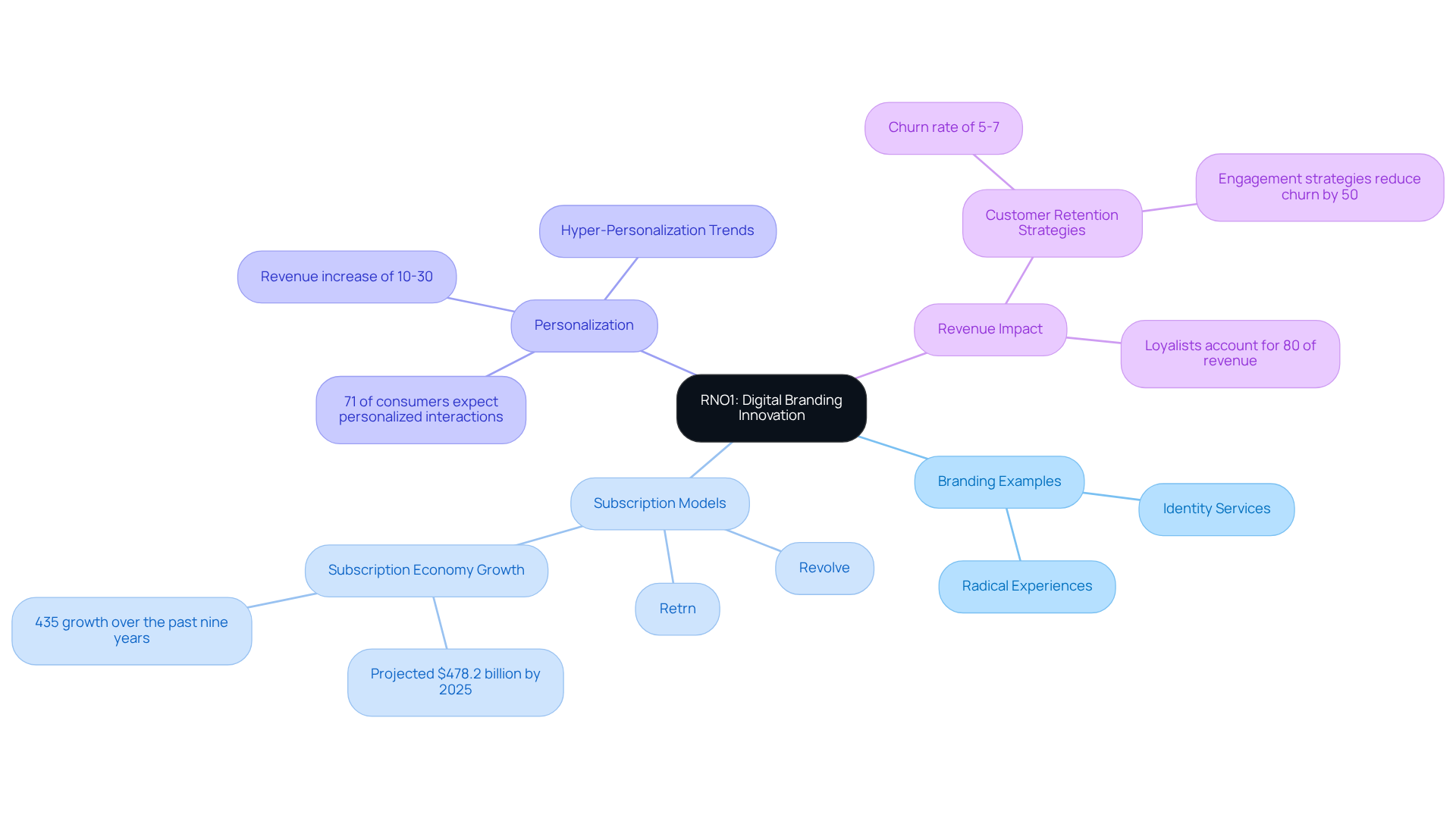
Slack: Engaging Users Through Dynamic Social Media Branding
In today's digital landscape, many companies struggle to create meaningful connections with their audiences. This challenge can lead to feelings of isolation and disengagement among users, which ultimately affects . Slack has beautifully addressed this issue by cultivating a vibrant online community that truly engages its users through dynamic content. Their playful tone and relatable messaging resonate deeply, making the company not just approachable but also memorable.
By leveraging platforms like Twitter and Instagram, Slack goes beyond merely promoting its features; they invite users to share their experiences, fostering a sense of belonging. This approach nurtures customer loyalty, as studies show that:
- 90% of consumers believe user-generated content (UGC) significantly influences their purchasing decisions.
- 82% are more inclined to buy from companies that effectively harness UGC.
The power of authentic interactions is further evidenced by the fact that UGC can lead to 29% higher web conversions, highlighting how meaningful engagement can build lasting relationships.
Recent trends reveal that companies prioritizing user engagement through social media are reaping the rewards of heightened loyalty and trust. Slack serves as one of the key branding examples of how dynamic content can transform digital experiences, providing a supportive model for others to follow. By embracing the voices of their community, Slack not only enhances its brand but also fosters a nurturing environment where users feel valued and connected.
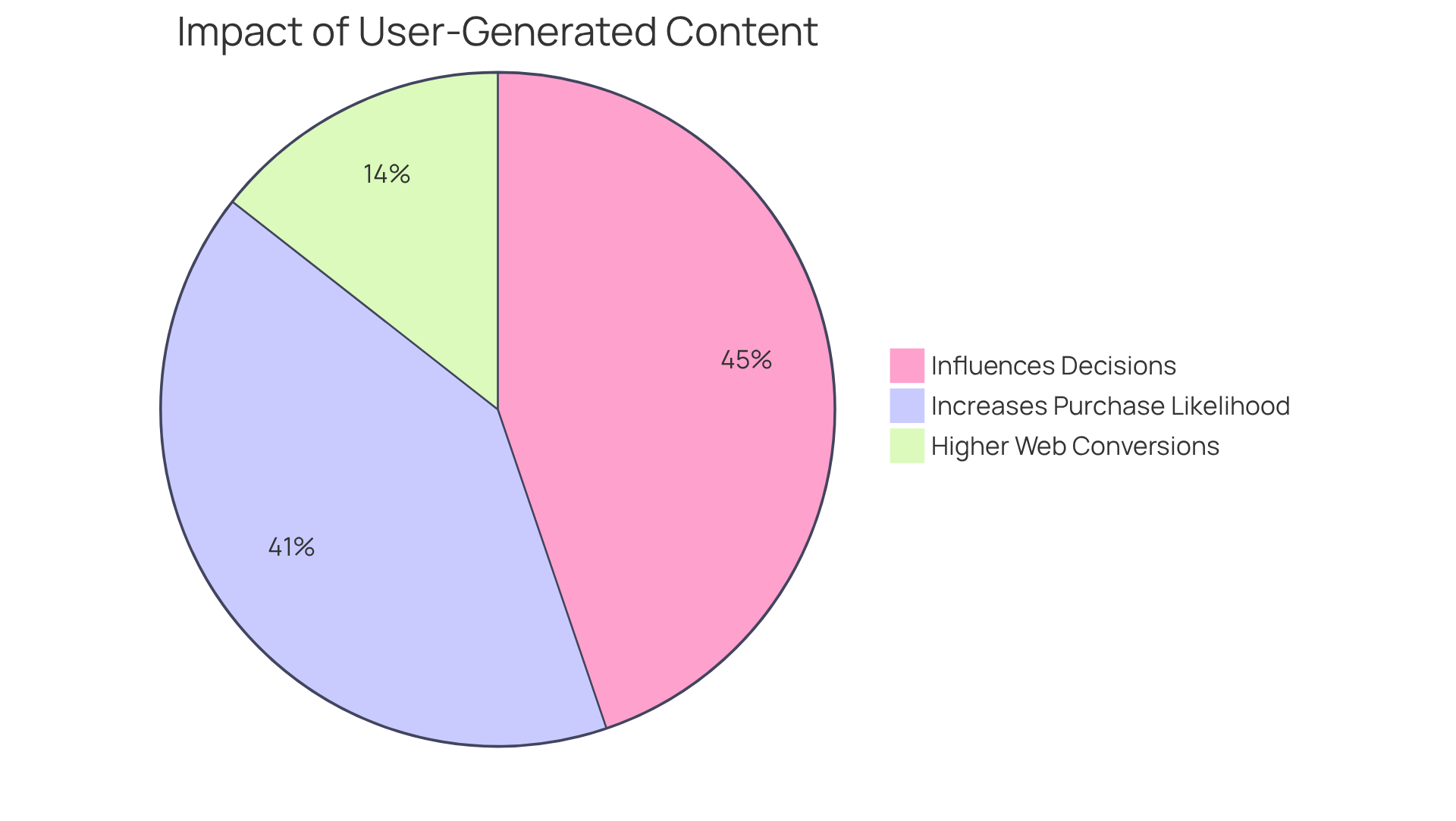
McKinsey: Building Authority with In-Depth Case Studies
In today's competitive landscape, many tech startup founders face the challenge of establishing their authority and credibility. This struggle can lead to feelings of uncertainty and doubt, especially when navigating complex market dynamics. However, there is a nurturing solution that can help: McKinsey's in-depth . By showcasing practical applications of their methods, McKinsey offers potential clients solid proof of their expertise.
For example, case studies like "Digital Reinvention in Real Estate" and "Bridgestone's Digital Transformation" not only highlight successful outcomes but also serve as valuable educational resources, informing and engaging their audience. This strategic approach fosters trust, positioning McKinsey as a thought leader and making their brand synonymous with reliability and expertise.
As we look ahead to 2025, the significance of such case studies becomes even more pronounced, as companies increasingly seek validated approaches to tackle intricate challenges. Current trends in authority building through content marketing further underscore the necessity of showcasing branding examples as successful strategies.
As organizations aim to establish credibility, they can draw inspiration from McKinsey's approach. As Ethan M. Rasiel aptly states, "Facts are friendly," reminding us of the importance of data-driven decision-making in building authority. By leveraging these insights, tech startup founders can nurture their own paths to success.
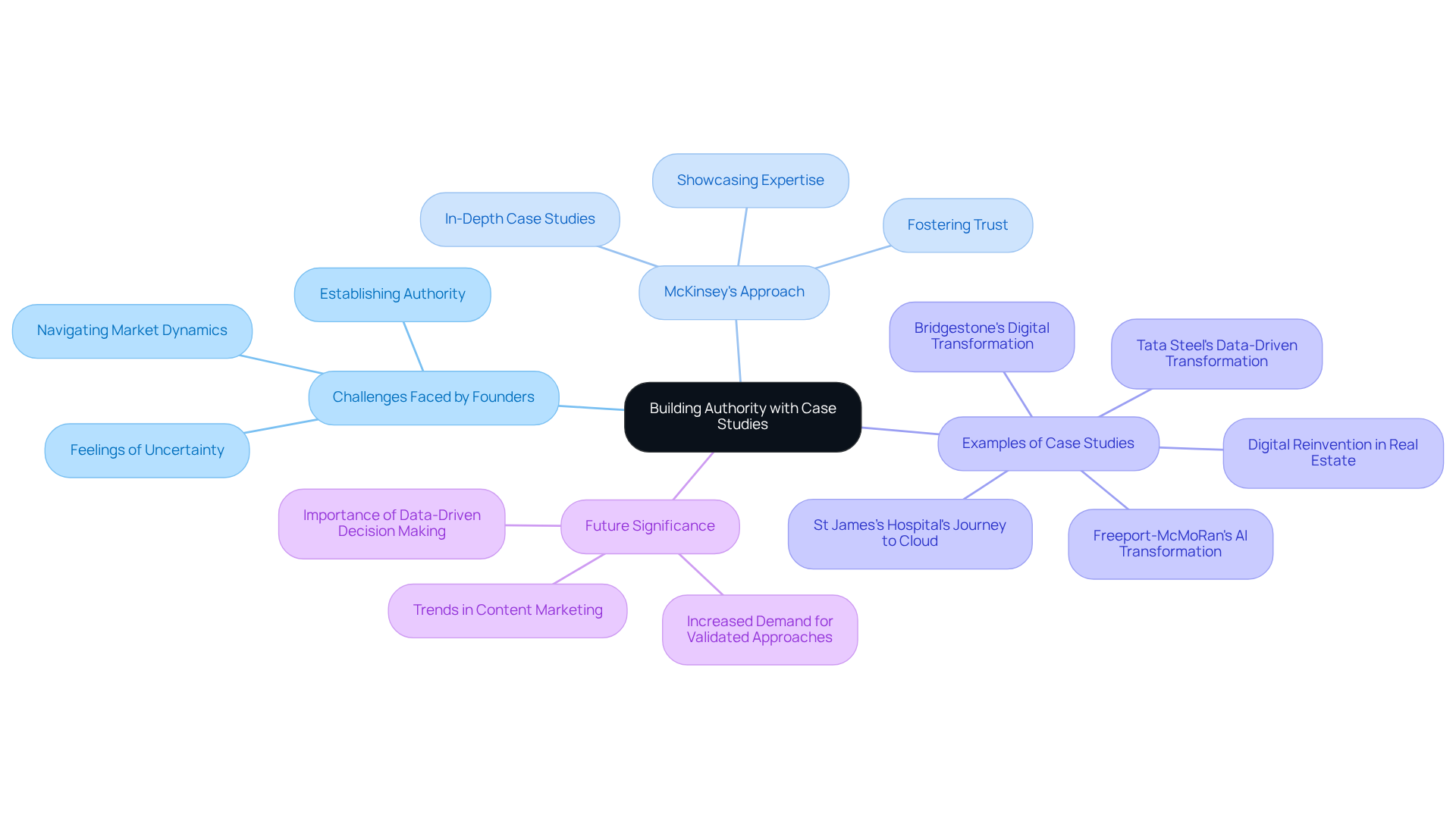
Mailchimp: Crafting Unique Narratives Through Original Content
In a competitive market, small businesses often struggle to connect with their audience on a deeper level. This emotional disconnect can lead to missed opportunities and a lack of customer loyalty. Mailchimp understands this challenge and excels in crafting unique narratives that resonate with their audience. Through such as blogs, podcasts, and videos, they tell stories that not only promote their services but also provide genuine value to their users. This narrative-driven approach not only helps Mailchimp stand out but also fosters a nurturing emotional connection with its audience.
By concentrating on storytelling, Mailchimp provides notable branding examples that enhance its identity and establish it as a reliable ally for small businesses. Studies show that companies sharing engaging narratives can experience a 20% increase in customer loyalty, and 64% of consumers express a desire for emotional ties with businesses. Moreover, storytelling can lead to a remarkable 30% increase in conversion rates, illustrating its effectiveness in marketing. By embracing storytelling, Mailchimp offers a supportive solution that empowers small businesses to build lasting relationships with their customers.
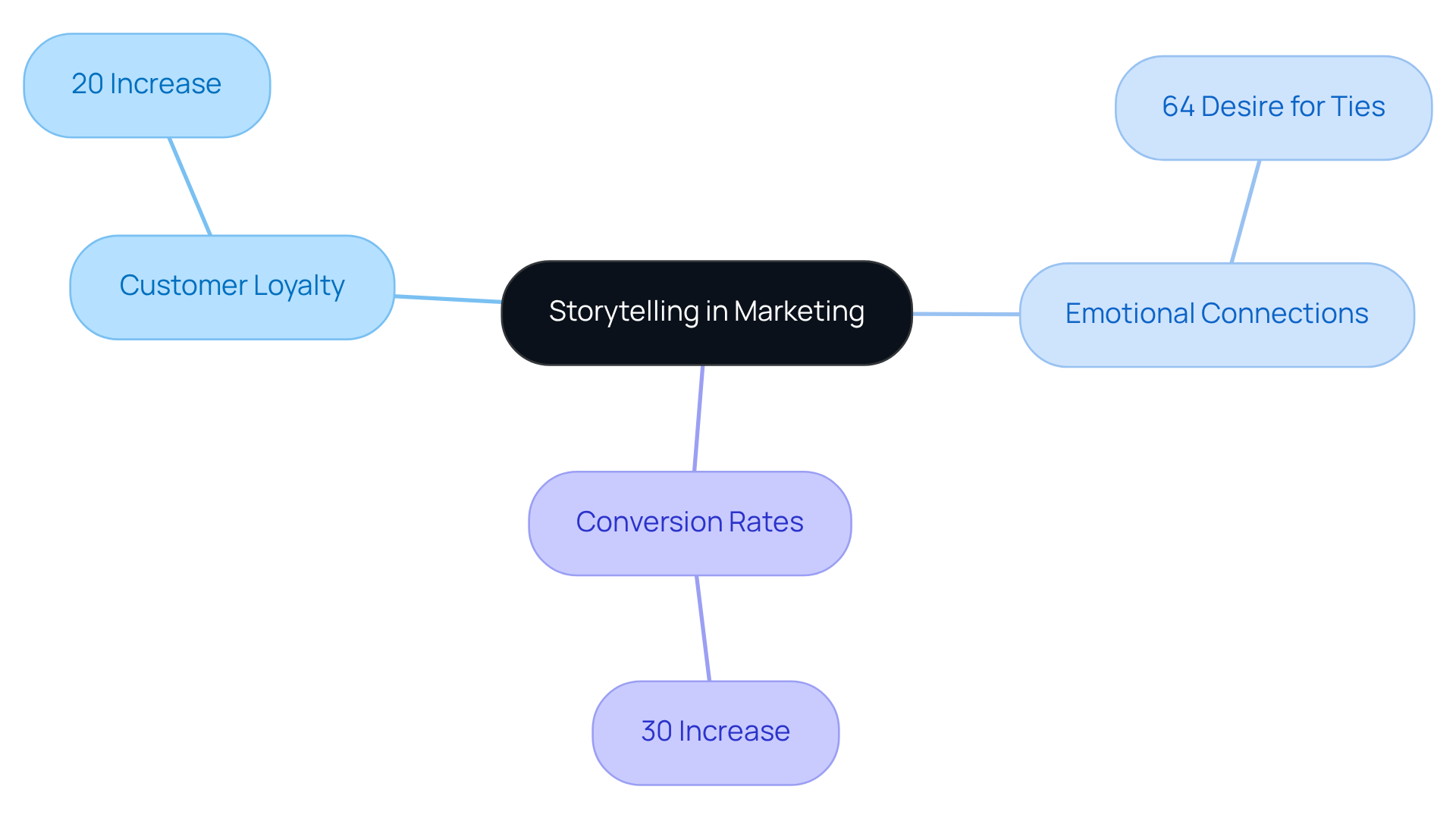
HubSpot: Driving Engagement with Educational Content Marketing
In the world of marketing, many startups struggle to find their footing, often feeling overwhelmed by the complexities of strategy and execution. This challenge can lead to frustration and uncertainty, making it difficult for founders to connect with their audience effectively. HubSpot recognizes this pain and has stepped in to offer a nurturing solution.
By establishing itself as a leader in educational content marketing, HubSpot provides an extensive array of resources designed to empower users in refining their marketing strategies. Through detailed guides and , HubSpot delivers insights that not only captivate their audience but also reinforce its position as an industry authority. This dedication to education cultivates trust and loyalty among users, prompting them to rely on HubSpot for their marketing needs.
As a result, the company experiences improved client retention and advocacy, demonstrating the profound impact of educational resources on brand loyalty in 2025. Notably, organizations that prioritize customer education see a 63% reduction in attrition rates, and companies focusing on customer experience experience 51% better customer retention. Additionally, companies that emphasize content marketing and blogging are 13 times more likely to experience a positive return on investment, highlighting the efficacy of such approaches in building long-term relationships.
By choosing to invest in education, startups can foster a supportive community and pave the way for lasting success.
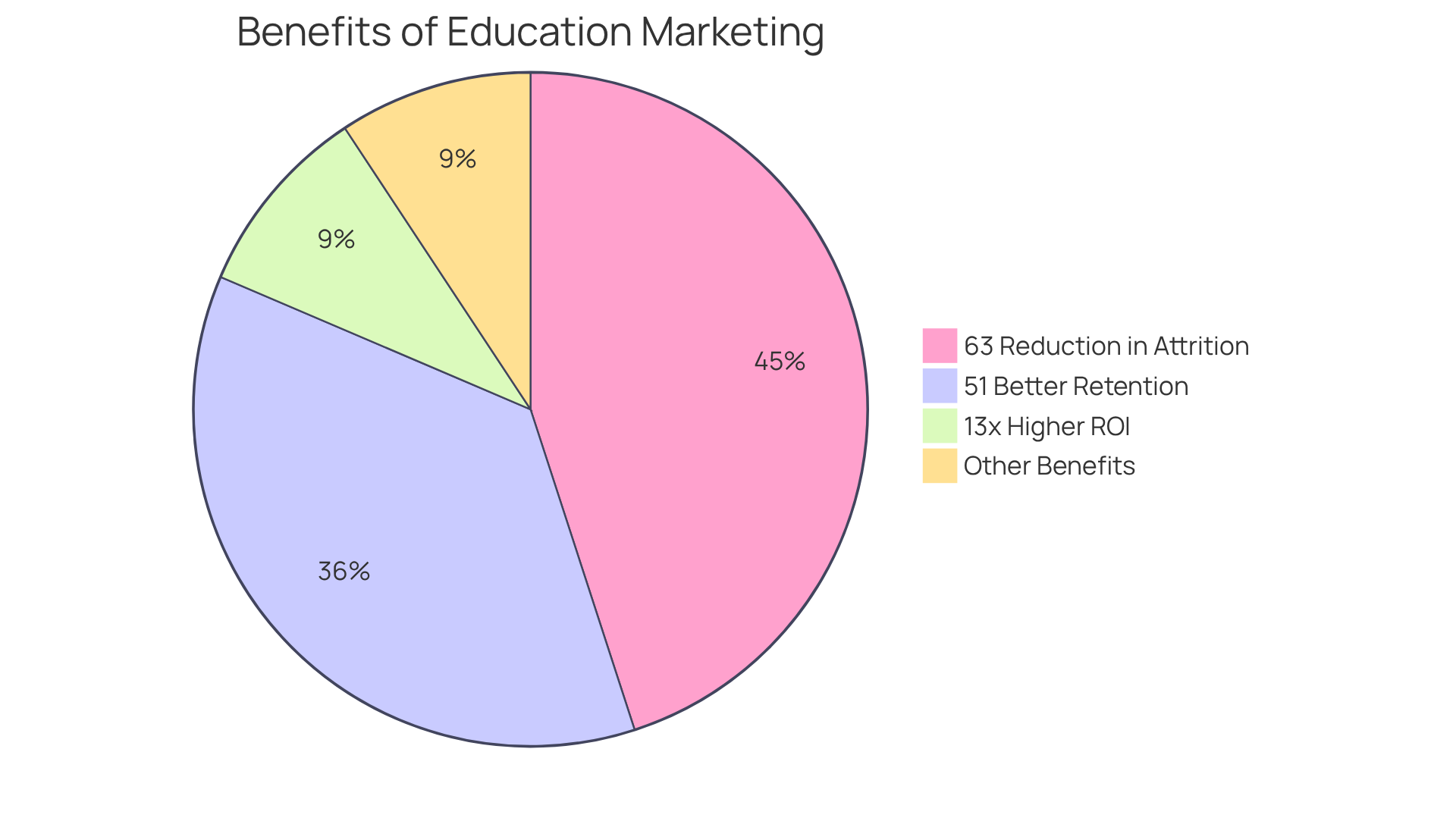
LinkedIn: Leveraging Professional Networks for Enhanced Branding
Many professionals struggle to effectively promote themselves in today's competitive landscape. This challenge can lead to feelings of isolation and frustration, especially when trying to stand out among peers. LinkedIn offers a nurturing solution, providing a platform where individuals can connect, share insights, and showcase their expertise. By fostering a community that values knowledge and collaboration, LinkedIn not only strengthens its brand identity but also enhances user engagement. It becomes an invaluable resource for those looking to build their personal brands.
As we look ahead to 2025, it's clear that this platform is increasingly being recognized for its potential in personal promotion, with:
- 84% of B2B marketers acknowledging it as the most effective organic social media tool.
- 40% of B2B marketers considering LinkedIn the top channel for generating high-quality leads.
The sense of community on LinkedIn encourages knowledge sharing, with:
- 40% of users actively engaging with business pages weekly.
This highlights the importance of building connections and sharing valuable content. With over 2 billion interactions on LinkedIn pages each month, the is immense. There are countless success stories of professionals transforming their branding examples through community building on this platform, highlighting its vital role in shaping modern professional identities. By leveraging LinkedIn, you can not only enhance your visibility but also connect with a supportive network that fosters your growth.
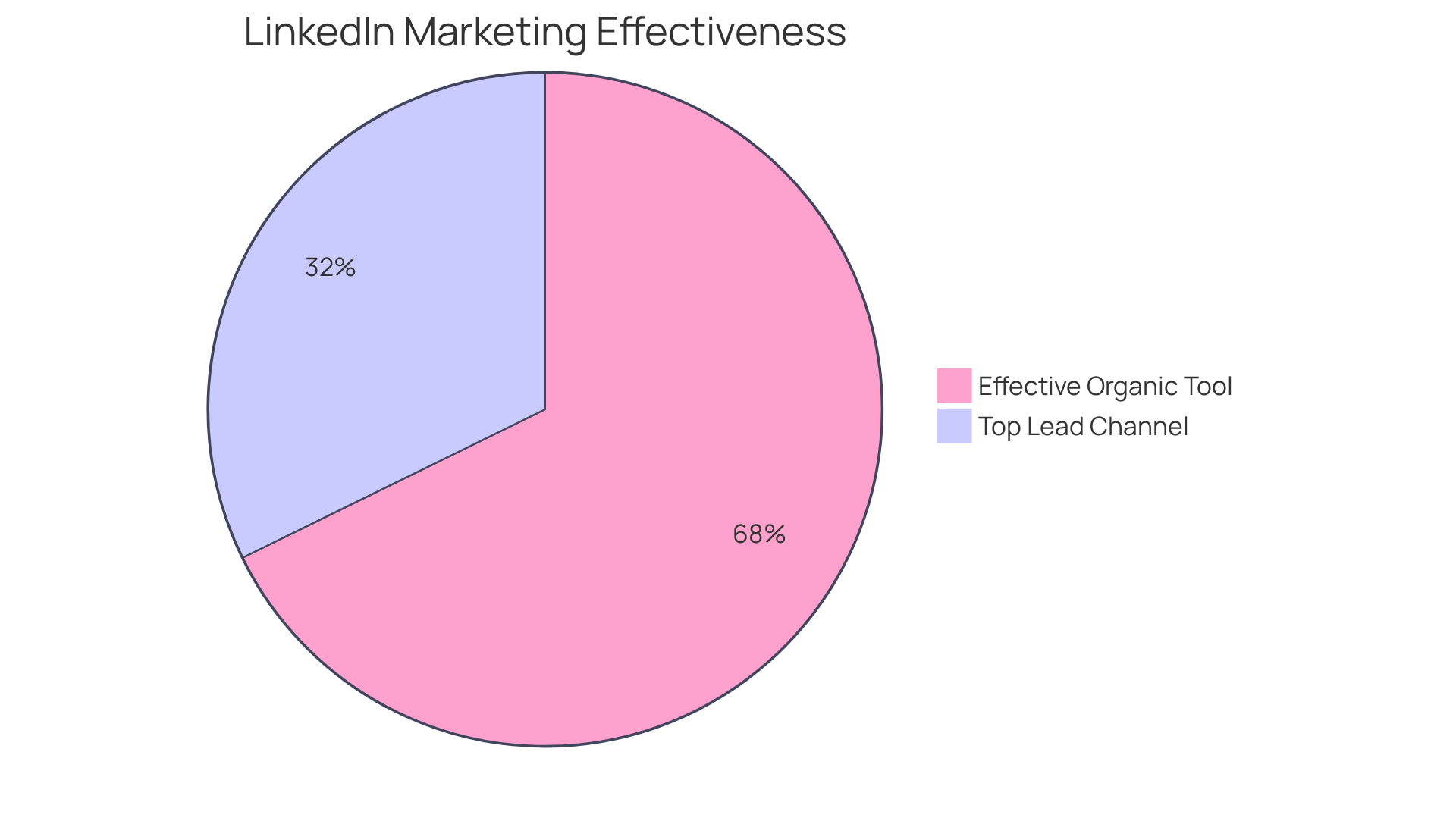
IBM: Establishing Industry Leadership Through Thought Leadership Content
In today's fast-paced technology landscape, many companies struggle to establish their authority and trustworthiness. This challenge can lead to uncertainty and hesitation among potential clients and partners. IBM has addressed this issue by leveraging thought leadership content, notably through the creation of white papers and research reports. These resources not only offer valuable insights but also serve to educate and inform audiences, nurturing IBM's reputation as a trusted authority in technology. By consistently delivering high-quality content, IBM fosters trust and loyalty among its stakeholders, significantly enhancing its reputation.
As we look ahead to 2025, the impact of such thought leadership becomes increasingly clear. Companies that prioritize research-driven content are gaining recognition for their authority in their respective fields. In fact:
- 58% of buyers choose businesses based on their thought leadership.
- 65% report that this content has positively shifted their perception of a company.
Through IBM's success stories, we see how can effectively establish and reinforce industry leadership, providing a model for others seeking to enhance their authority.
Moreover, 46% of buyers find thought leadership crucial for mending a company's reputation during controversies, highlighting its strategic importance in maintaining brand integrity. By sharing these insights, we hope to inspire tech startup founders to embrace similar strategies, fostering a sense of community and support as they navigate their own journeys toward establishing authority in the industry.
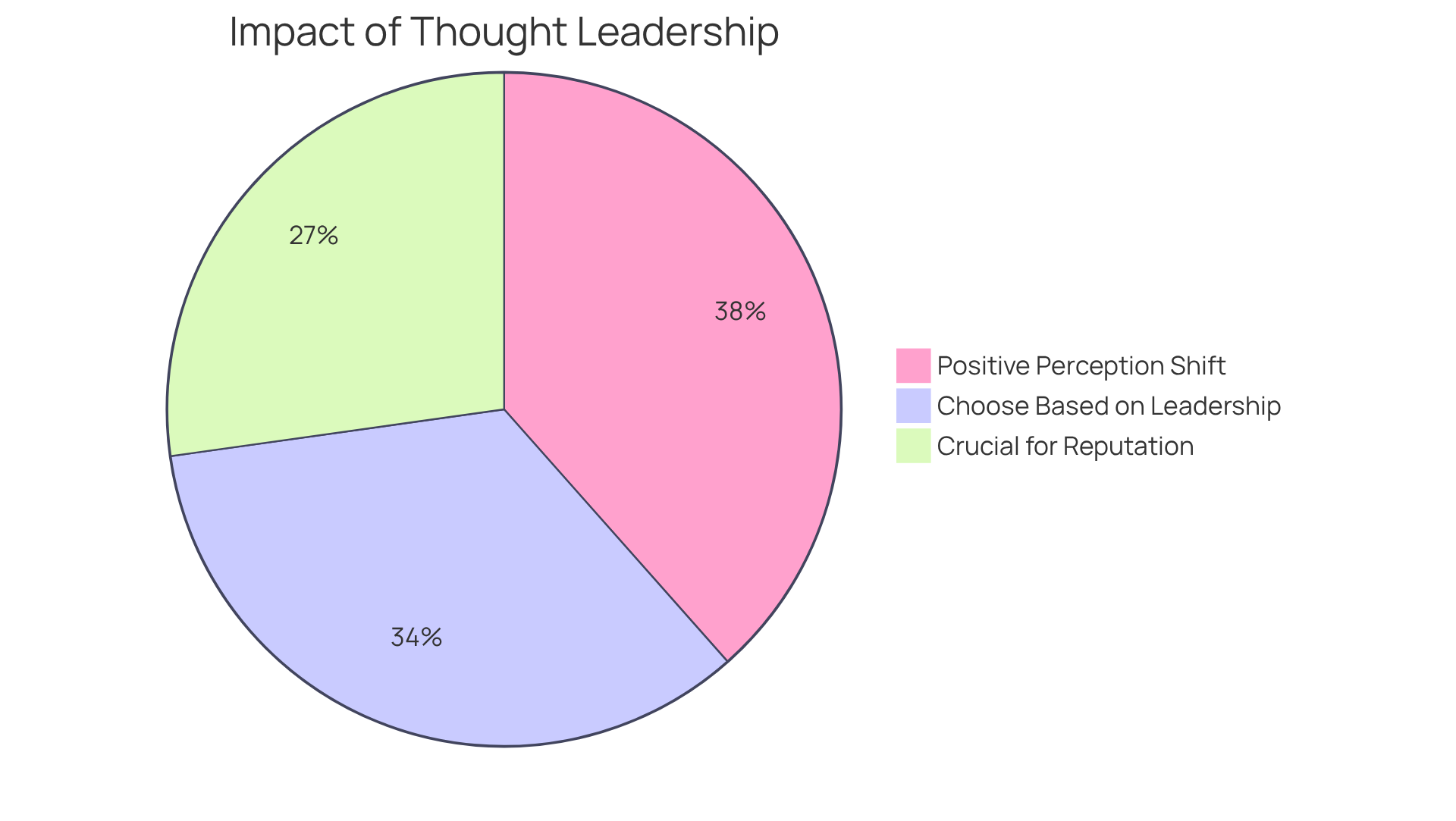
Microsoft: Building Trust with Compelling Customer Success Stories
In today's competitive landscape, establishing trust can be a significant challenge for many businesses. Prospective clients often feel uncertain when faced with choices, especially when they lack reliable information. This hesitation can be painful, as it stifles potential growth and connection.
Microsoft understands this struggle and effectively addresses it through compelling success narratives that highlight the real impact of its products and services. By sharing practical applications and favorable outcomes, Microsoft offers social proof that resonates deeply with potential customers. These success stories not only but also serve as powerful marketing tools, showcasing the true value of Microsoft solutions.
It's important to note that:
- 92% of customers are hesitant to purchase a product if there are no customer reviews, underscoring the need for trust-building strategies.
- By fostering this trust, Microsoft encourages new customers to engage with the brand.
- The impact of showcasing 5-star online reviews can be profound, with conversion rates potentially increasing by 270%.
This illustrates the financial influence of social proof on Microsoft’s marketing initiatives. As we look ahead to 2025, the importance of social proof in marketing will only grow, as consumers increasingly rely on genuine testimonials to guide their buying decisions. By sharing these narratives, Microsoft not only nurtures trust but also creates a supportive community where clients feel understood and valued.
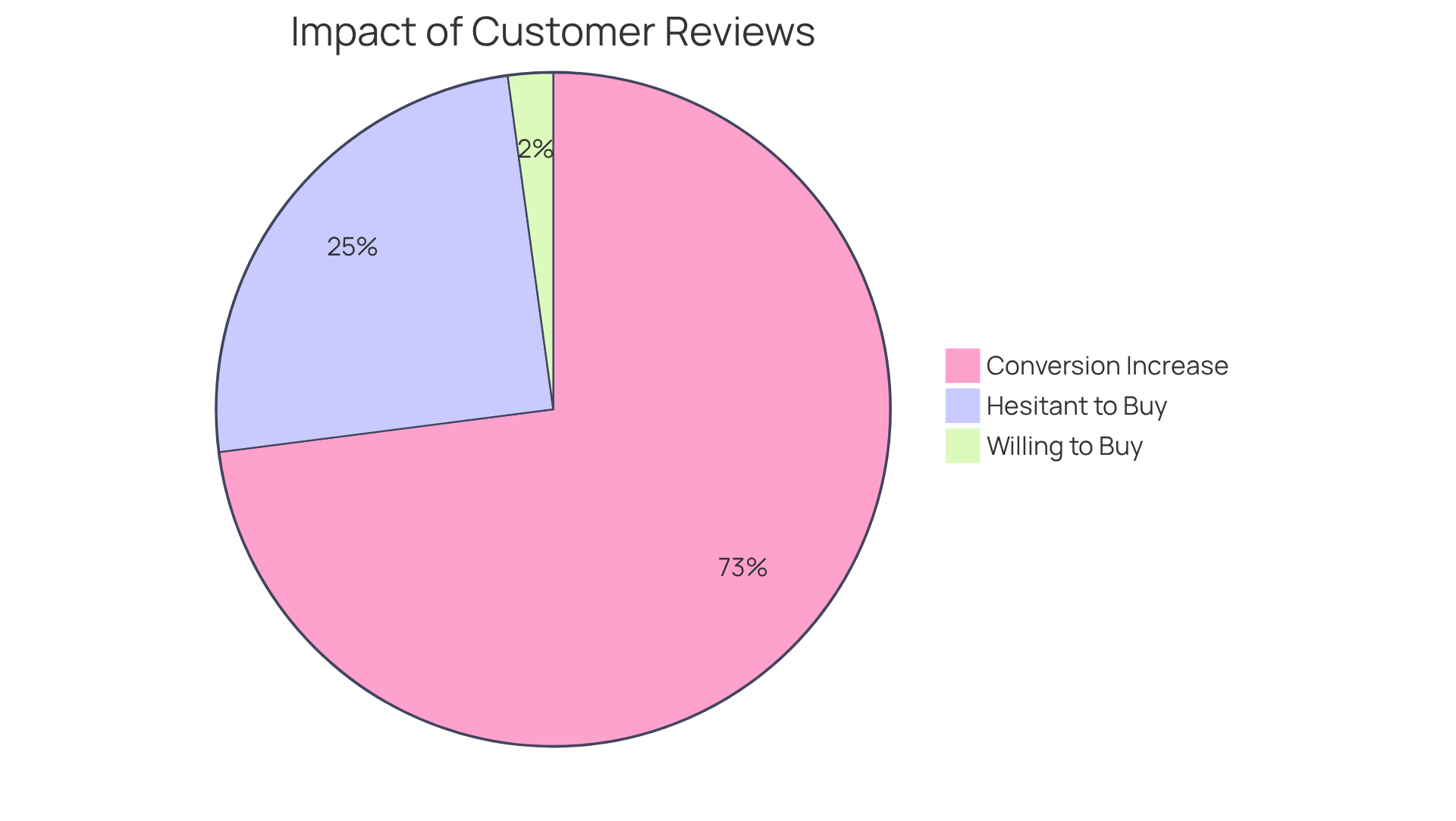
Gong Labs: Transforming Branding with Data-Driven Insights
In today’s competitive landscape, many companies struggle to connect meaningfully with their audiences. This disconnect can lead to missed opportunities and dwindling customer loyalty. Gong Labs understands this challenge and transforms marketing through its unwavering commitment to data-driven insights. By meticulously analyzing client interactions and behaviors, Gong Labs delivers actionable insights that shape effective branding examples. This analytical framework empowers brands to customize their messaging and engagement tactics, ensuring alignment with their target audience's preferences.
Imagine a company utilizing client analytics—these companies are 23 times more likely to surpass their rivals in client acquisition. This stark statistic highlights the pain points of those who overlook the importance of understanding consumer behavior. Moreover, data-driven organizations are six times more likely to retain clients, underscoring the need for a thoughtful approach to client relationships. It’s crucial to recognize that 32% of clients cease engaging with a company they cherish after just one negative experience. This reality emphasizes the significance of preserving a in marketing.
But there is hope. Organizations that adopt data-driven marketing strategies and analyze successful branding examples report an average increase of 8-10% in profit margins, and they are 19 times more likely to be profitable. By harnessing the power of data, Gong Labs not only enhances its marketing efforts but also solidifies its position as a leader in the sales enablement arena, driving significant improvements in customer engagement and overall performance.
RNO1's unique subscription models further assist companies in leveraging these insights for sustained growth. Together, we can navigate the complexities of marketing, ensuring that your brand not only survives but thrives in this ever-evolving landscape. Let’s work together to create a brighter future for your business.
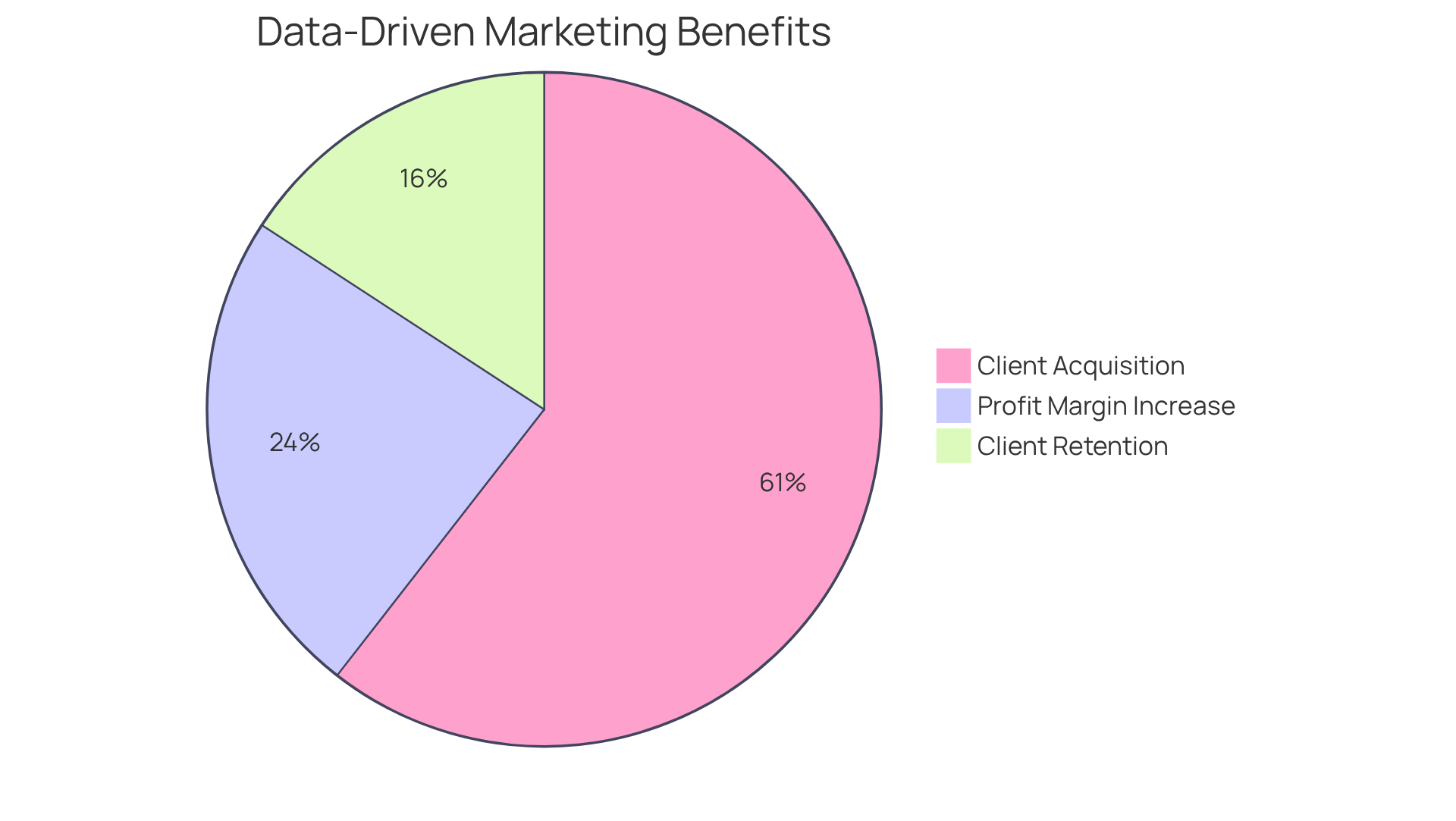
Cisco: Creating Impactful Brand Experiences Through Video Marketing
In today's fast-paced digital landscape, many brands struggle to create meaningful connections with their audiences. This can leave potential customers feeling overlooked and disconnected. Cisco recognizes this challenge and effectively utilizes video marketing to create impactful experiences that not only engage but also inform its audience. By producing high-quality videos that showcase their products, services, and industry insights, Cisco enhances its storytelling capabilities, drawing interest and promoting a stronger bond with viewers. This approach makes the brand more relatable and unforgettable.
As we navigate this ever-evolving marketplace, it's crucial to understand the power of video content. Research shows that:
- 89% of consumers report that watching a video has convinced them to purchase a product or service.
- 87% have bought a product after watching a product demo.
These statistics underscore the critical role of video in driving engagement and fostering brand loyalty. As we approach 2025, the significance of video content in brand development continues to grow, with:
- 95% of marketers recognizing its value in their strategies.
- 93% reporting positive ROI from video marketing.
- 78% of people preferring to learn about products or services through video.
This highlights the necessity of incorporating video into branding strategies.
Cisco's commitment to utilizing video effectively, including the rising trend of personalized video experiences powered by AI, positions it as a leader in multimedia marketing. This dedication demonstrates the transformative power of video in enhancing audience engagement and brand perception, offering a supportive solution for tech startup founders looking to connect with their communities. By prioritizing video content, Cisco not only reinforces its branding examples but also improves its overall marketing approach, paving the way for a more engaged and loyal audience.
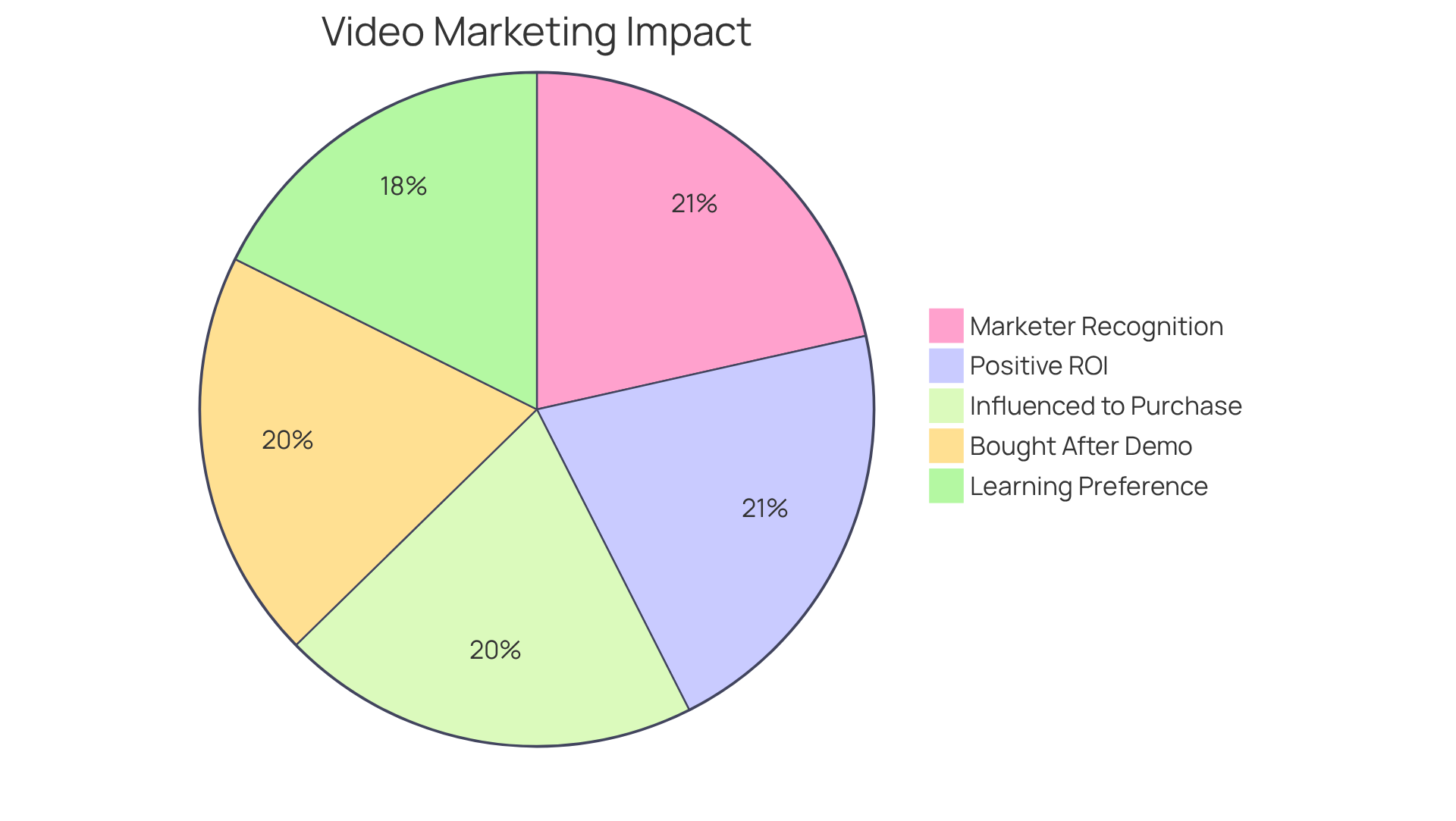
Conclusion
In today's digital landscape, where branding is increasingly essential, many businesses struggle to connect meaningfully with their audiences. This challenge can lead to feelings of isolation in a crowded market, where standing out seems daunting. However, the examples we've discussed illuminate how innovative strategies can not only transform brand experiences but also foster genuine connections with consumers.
Take RNO1's subscription models, for instance, which drive ongoing engagement and create a sense of community. Similarly, Slack's dynamic social media interactions exemplify how brands can cultivate relationships that resonate. Companies like McKinsey and IBM remind us of the importance of case studies and thought leadership in establishing authority, while Mailchimp and HubSpot showcase the power of storytelling and educational content in nurturing loyalty. Moreover, organizations like Microsoft and Gong Labs highlight the necessity of trust and data-driven insights in fostering customer relationships.
As we look toward 2025, embracing these diverse branding strategies becomes vital for success. By prioritizing customer engagement, leveraging data, and crafting authentic narratives, brands can enhance their visibility and build lasting connections with their audiences. The future of branding lies in our ability to adapt and innovate, ensuring that every interaction resonates and nurtures a supportive community around the brand. Together, we can navigate this evolving landscape with compassion and creativity, paving the way for a brighter branding future.
Frequently Asked Questions
What is RNO1's approach to digital branding?
RNO1 focuses on creating radical experiences that resonate with modern consumers through extensive identity services and advanced digital product design. They utilize innovative subscription models like Revolve and Retrn to provide ongoing support and foster continuous innovation.
How does RNO1's subscription model benefit businesses?
The subscription model allows companies to adapt quickly to changing market dynamics, enhancing visibility and encouraging long-term client loyalty. This approach aligns with the expanding subscription economy, which is projected to reach $478.2 billion by 2025.
What is the significance of hyper-personalization in digital marketing according to RNO1?
Hyper-personalization is essential as over 71% of consumers expect personalized interactions. RNO1's effective personalization strategies can lead to a revenue increase of 10-30%, demonstrating the financial benefits of tailored marketing approaches.
What statistic highlights the importance of customer retention for businesses?
While only 30% of subscribers are loyalists, they account for nearly 80% of all revenue. This emphasizes the need for businesses to focus on customer retention strategies to maximize revenue.
How does Slack engage its users through social media branding?
Slack engages users by cultivating a vibrant online community with dynamic content and a playful tone. They invite users to share experiences, fostering a sense of belonging and enhancing brand loyalty.
What impact does user-generated content (UGC) have on consumer behavior?
Studies show that 90% of consumers believe UGC significantly influences their purchasing decisions, and 82% are more inclined to buy from companies that effectively utilize UGC. It can also lead to 29% higher web conversions.
How does McKinsey establish authority and credibility in the competitive landscape?
McKinsey uses in-depth case studies to showcase practical applications of their methods, providing solid proof of their expertise. These case studies serve as educational resources and help foster trust with potential clients.
Why are case studies important for tech startup founders?
Case studies help establish authority and credibility, which are crucial for navigating complex market dynamics. They provide validated approaches to tackle challenges, positioning brands as reliable and knowledgeable in their fields.
What does Ethan M. Rasiel emphasize about building authority?
Ethan M. Rasiel states, "Facts are friendly," highlighting the importance of data-driven decision-making in establishing authority and credibility in the business landscape.




